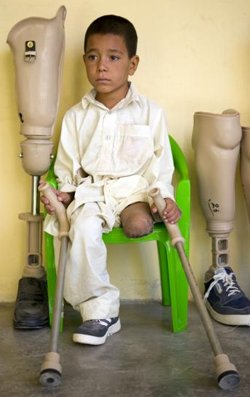
Children are the worst victims in Afghanistan. (Photo: UPI)
Geneva - Aid organization Medecins Sans Frontieres (MSF) released Monday its list of the ten worst global humanitarian crises for 2009, with places like Somalia, Yemen and Afghanistan making the grouping, along with failing efforts to fight malnutrition and HIV/AIDS. "There is no question that civilians are increasingly victimized in conflicts and further cut off from lifesaving assistance, often deliberately," said Christophe Fournier, the president of MSF (Doctors Without Borders).
In Afghanistan, MSF warned there were "only a few poorly functioning hospitals and clinics in provincial capitals" leaving many without any access to medical services, as the country underwent increasing levels of violence.
"In places like Sri Lanka and Yemen, where armed conflicts raged in 2009, aid groups were either blocked from accessing those in need or forced out because they too came under fire. This unacceptable dynamic is becoming the norm," Fournier said.
Civilians were also "attacked, bombed, and cut off from aid" in Pakistan, and the Democratic Republic of Congo, while the doctors' organization said it remained concerned over the persistent humanitarian problems in southern Sudan and the western region of Darfur.
The group said an estimated 3.5 to 5 million children die each year from malnutrition-related causes and blamed a lack of donor funding along with a misuse of funds that are given.
"MSF found that less than two per cent of (the) assistance is spent on food that includes the nutrients required to prevent childhood malnutrition," a statement said.
Similarly, funding for HIV/AIDS treatment appeared to be winding down, in spite of donors' pledges, while research for cures for neglected diseases in the developing world was lacking.



